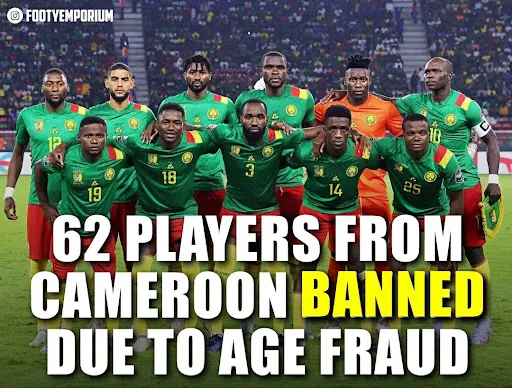'FECAFOOT's age fraud: the scandal that's keeping fans on the edge of their seats.'
Age fraud, also known as age cheating, is when a player falsifies their age to play in a younger age category. This is a widespread issue in football, with many players and teams resorting to this unethical practice to gain a competitive advantage. Unfortunately, this practice has now caught up with 62 players in the Cameroon Football Federation (FECAFOOT), leading to their suspension.
FECAFOOT recently announced that they have suspended 62 players from their national youth teams due to alleged age fraud. This decision was made after an investigation by the federation's medical committee, which found discrepancies in the players' age documents. The affected players range from under-17 to under-23 teams, and their suspensions are effective immediately.
This suspension has caused shockwaves in the football community, not just in Cameroon but also globally. It has raised questions about the effectiveness of age verification processes and the prevalence of age fraud in football. It also highlights the need for stricter measures to prevent and punish those involved in such unethical practices.
One of the main concerns with age fraud is that it not only goes against the principles of fair play but also puts younger players at a disadvantage. When older players compete in a younger age category, they have a physical and mental advantage over their opponents, which can greatly affect the outcome of the game. This not only undermines the integrity of the sport but also hinders the development of young players who are genuinely of the specified age.
Moreover, age fraud can also have long-term consequences for the players involved. Many young players who falsify their age do so in hopes of gaining recognition and opportunities to play for professional teams. However, when their true age is eventually discovered, they could face serious repercussions, including suspension, fines, and in some cases, even legal action. This can not only damage their reputation but also hinder their chances of a successful football career.
The FECAFOOT suspension of 62 players is a step in the right direction towards eradicating age fraud in football. It sends a strong message that such unethical practices will not be tolerated and that those involved will face consequences. However, this is just the tip of the iceberg, and more needs to be done to combat age fraud in football.
One way to prevent age fraud is to implement stricter age verification processes. This could include conducting thorough background checks and cross-checking documents with official records. Additionally, regular and surprise age checks during tournaments and competitions can also act as a deterrent for players and teams considering age fraud.
Furthermore, education and awareness programs can also play a crucial role in preventing age fraud. Many young players may not fully understand the consequences of falsifying their age and may be influenced by others to do so. By educating them about the importance of fair play and the negative impact of age fraud, we can promote a culture of honesty and integrity in football.
In conclusion, the FECAFOOT suspension of 62 players for age fraud is a wake-up call for the football community. It highlights the need for stronger measures to prevent and punish age fraud in football. It is crucial that all stakeholders, including football federations, clubs, coaches, and players, work together to create a fair and transparent playing field for all. Only then can we truly celebrate the beautiful game and its values of fair play and integrity.
 Reviewed by Nformi Antionette. CEO Netta Brand
on
March 15, 2024
Rating:
Reviewed by Nformi Antionette. CEO Netta Brand
on
March 15, 2024
Rating:










No comments:
Disclaimer:Any comment you make on this page, is strictly at your own risk and those not reflect the view of the publishers.
For any information contact by E-mail:
abanda@writeme.com